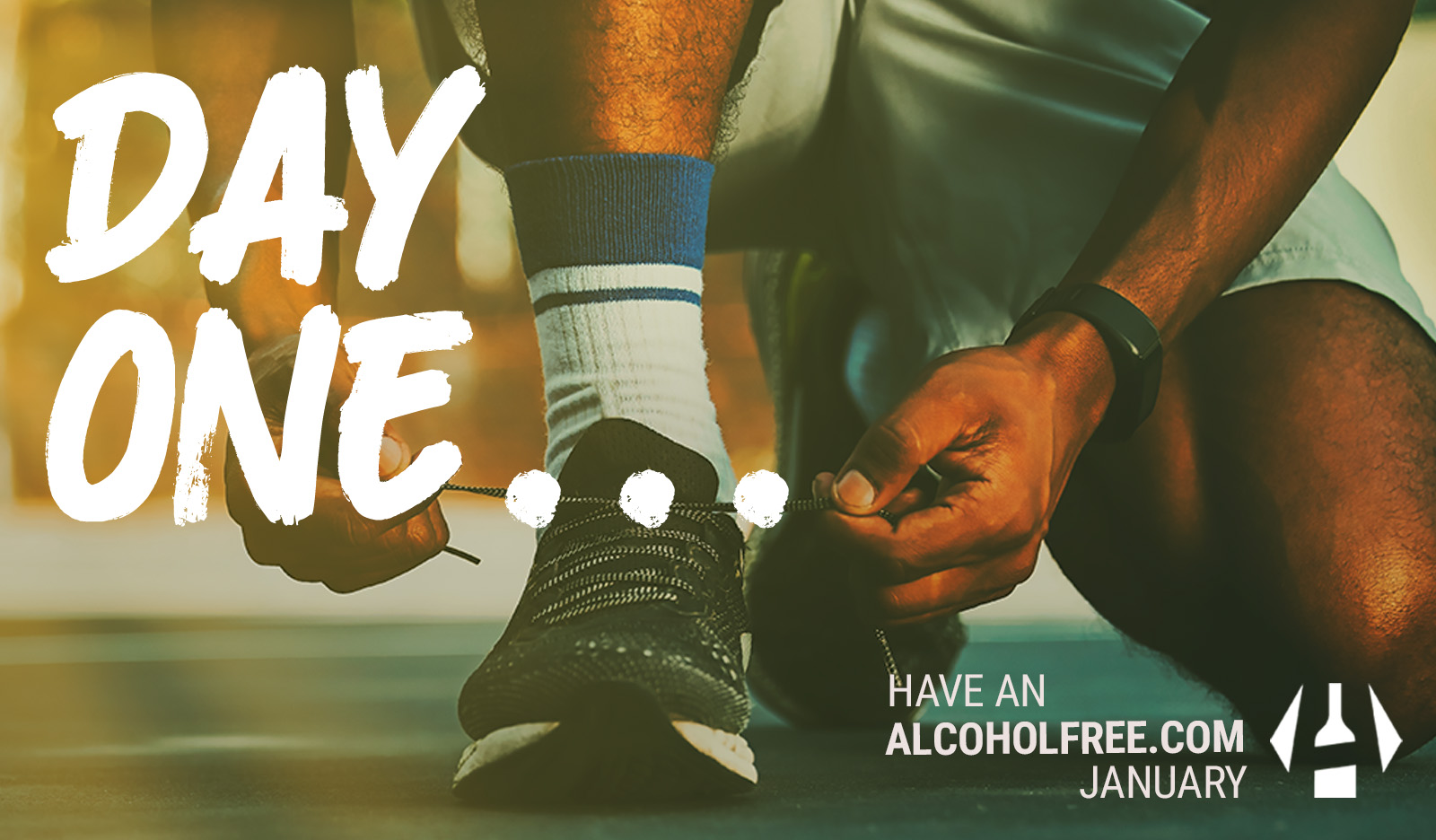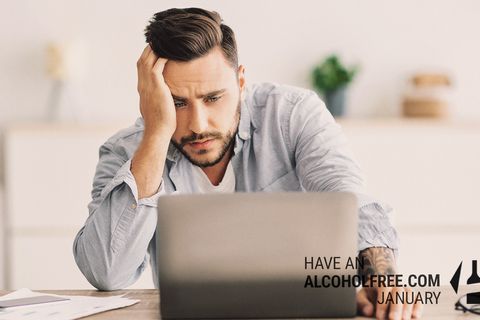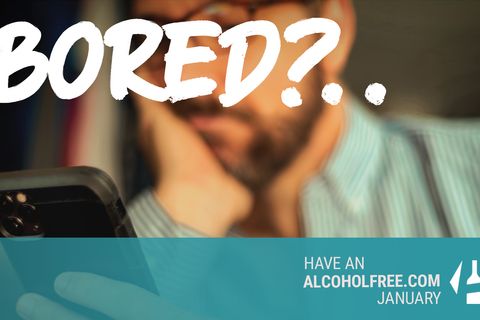Stopping Drinking
Leaving Alcohol Behind? What You Absolutely Need to Know Before You Try Dry

by John Risby
Published: January 01, 2023 Last updated: November 30, 2023

When you're considering taking a break from the alcohol, cutting down or aiming to adopt a life free from alcohol, there may be doubts in your mind about the benefits, the pitfalls and the fear of missing out.
Many of us have invested years, maybe decades - and certainly wads of cash - in nurturing our love for alcohol.
It's been there through thick and thin, in times of joy and sadness and it can be hard to imagine life without that 'friend' to hold.
Even when we realise that this relationship has become toxic and it's hold on us is strangling our hopes and dreams, it's hard to break free.
But stepping on the road to living alcohol free can provide numerous benefits for both physical, mental and financial health.
If you’re planning to break the habit, then read on to find out what to expect and how to manage the challenges ahead.
The benefits to your health…
On a physical level, cutting back on alcohol can lead to improved sleep, weight loss, and better overall health. Alcohol has been known to disrupt sleep, so reducing or eliminating alcohol consumption can result in more restful sleep. Additionally, alcohol contains empty calories that can contribute to weight gain, so reducing alcohol intake can support weight loss efforts. In terms of overall health, alcohol has been linked to an increased risk of certain cancers and liver damage, among other health problems. By reducing alcohol intake, it is possible to decrease the risk of these and other negative health outcomes.
And the benefits for your wealth
In terms of financial benefits, reducing alcohol consumption can also be helpful. Alcohol can be expensive, especially when consumed regularly or in large quantities. Cutting back on drinking can save money that might otherwise be spent on drinks. And we’re more likely to spend money on pointless things when we’ve had a drink or ten.
This can be especially beneficial in times of economic uncertainty or when trying to save money for other goals. The current cost of living crisis means many of us are struggling to pay for essentials such as food and heating, so saving money is especially handy.
Overall, reducing alcohol intake can provide numerous benefits for both physical and financial health, making it a worthwhile consideration for anyone looking to make positive changes in their life.
Alcohol withdrawal and medical guidance
If you’re a very heavy drinker, are dependent on alcohol, or you’ve been drinking very heavily for an extended period of time - more than 30 units a week if you're a woman or 50 if you're a man - don't stop without speaking with a healthcare provider or addiction specialist.
Although very rare, some people may experience negative reactions or even death if they stop drinking abruptly. These reactions, known as alcohol withdrawal symptoms, can range from mild to severe and can include tremors, seizures, and delirium tremens (DTs). DTs, a severe form of alcohol withdrawal, can be life-threatening and require immediate medical attention.
Be aware of the signs and symptoms of alcohol withdrawal, which can include tremors, sweating, anxiety, insomnia, and nausea. If you experience any of these symptoms after suddenly stopping alcohol, you should seek medical attention as soon as possible.
A healthcare provider or addiction specialist can assess your situation and provide guidance on how to safely and effectively reduce your alcohol intake. They may recommend a reduction program, where you can gradually decrease your alcohol consumption over time, or a medical detox program, where you can receive close monitoring and support to manage any withdrawal symptoms you may experience.
Remember, seeking medical guidance does not mean you are weak or unable to quit on your own. Rather, it’s a proactive step towards ensuring a safe and successful detox process. It’s always better to be safe than sorry when it comes to your health, and seeking medical guidance can give you the support and resources you need to successfully reduce or eliminate alcohol from your life.
Most people can stop drinking safely
If you’re a heavy drinker - consuming up to 30 units a week if you're a woman and up to 50 if you're a man - and decide to stop drinking, you will probably experience some unpleasant withdrawal symptoms.
These can include tremors, insomnia, irritability, and fatigue. While these symptoms can be uncomfortable, they are generally not severe and can be managed with self-care measures such as staying hydrated, getting plenty of rest, and eating a healthy diet.
It’s important to remember that these symptoms are not a reason to continue drinking. While it may be tempting to give in to cravings or use alcohol to alleviate withdrawal symptoms, doing so will only prolong the detox process and potentially lead to more serious health problems.
With the right mindset and support, it’s possible to overcome relatively mild withdrawal symptoms and achieve your goals of reducing or eliminating alcohol from your life. Don’t let temporary discomfort hold you back from making positive changes that can improve your overall health and well-being.
When you may need professional help
We had the opportunity to interview Dr. Peter Rice, a specialist in alcohol harm reduction. In our interview, Dr. Rice discussed a guide that he helped produce with the Scottish Health Action on Alcohol Problems (SHAAP).
This guide is a useful resource for understanding when professional help may be necessary for reducing or quitting alcohol. It can help you determine if you need help, whether you can cope with a self-managed detox, or whether you will be fine to just stop.
If you’re unsure about whether you need professional help with alcohol reduction or detox, consider the following questions:
- Do you drink more than the recommended daily, weekly, or monthly limits for alcohol?
- Do you feel like you need to drink more to get the same effects?
- Do you have physical withdrawal symptoms when you stop drinking or reduce your intake (e.g. tremors, sweating, anxiety)?
- Do you feel like you need a drink to get through the day or to relax?
- Do you drink alone or in secret?
- Have you ever felt guilty or ashamed about your drinking?
- Have you ever experienced blackouts or memory loss due to drinking?
If you answered “yes” to any of these questions, it may be a good idea to seek professional help with reducing or quitting alcohol. A healthcare provider or addiction specialist can provide you with the support and resources you need to make a successful transition to sobriety. Don’t let fear or hesitation hold you back from seeking help – taking this step can be the first step towards a healthier and happier life.
Taking the first step
You’ve made a great decision to take a break from alcohol, or maybe even to reduce or quit altogether. Congratulations on taking this first step towards improving your physical and financial health!
Every journey is different. Remember to be patient with yourself and celebrate your successes along the way. With the right mindset and resources, you can achieve your goals and make positive changes in your life. Good luck!
Takeaways
Cutting back on alcohol can lead to improved sleep, weight loss, and overall health
Reducing alcohol intake can also have financial benefits, such as saving money that would have been spent on drinks
If you are a heavy drinker, it is important to seek medical guidance before suddenly stopping alcohol consumption
Mild withdrawal symptoms, such as tremors and insomnia, may be experienced by moderate drinkers who stop drinking suddenly
There are a variety of strategies and resources available to help people reduce or quit alcohol consumption, including support groups, therapy, and medications

About The Author
John Risby
Co-Founder of The Alcohol-Free Shop and AlcoholFree.com. John is a recovering alcoholic who stopped drinking in June 2004. Born and raised in Manchester, he now lives in Malaga with his wife and young daughter. He came to terms with being an alcoholic many years ago, but still finds the concept his daughter is Spanish very strange.
Seven Totally Random Ideas To Help You Reach The End Of Your First Dry Month
January 23, 2023

Wine-Free Winter: How to Combat Cold And Boring Nights Without Booze
January 19, 2023

The missing piece to your sobriety puzzle: Understanding your triggers
January 16, 2023

How to cope with work-related stress without turning to alcohol
January 09, 2023

Your First Alcohol-Free Friday Night and How to Survive It
January 06, 2023

Tips for Dealing with Boredom and Isolation When Giving Up Drinking
January 02, 2023

Guidelines to help heavy drinkers quit
June 16, 2020

What's the quickest way to sober up?
May 05, 2019
